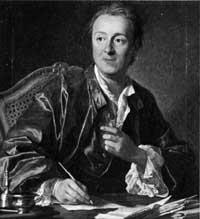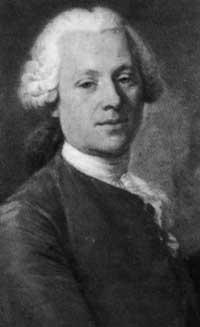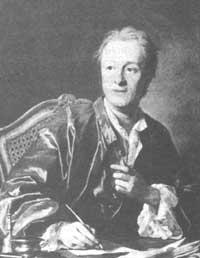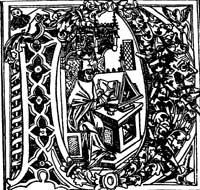DIDEROT DENIS
1995/01/01 Azkune Mendia, Iñaki - Elhuyar Fundazioa Iturria: Elhuyar aldizkaria
This French encyclopedist was born in Langres (Upper Marne) on November 5, 1713. He studied at a Jesuit college from 1723 to 1728 and in 1729 worked at the University of Paris until in 1732 he obtained a doctorate in arts. Although there is no record of what he did in the next ten years, he is considered to have dealt with many different issues.
In 1743 he secretly married Antoinette Champion. In 1746, Philosophical Thought (Pensées Philosophiques) wrote his first work, which was rejected by the Paris Parliament a month after its publication. That same year, together with the mathematician D’Alembert, he signed the contract to return the French English encyclopedia Cyclopaedia de Chambers. In 1748 his first novel, Indiscrete Jewels, was published.
He also published a report on the different mathematical topics. The following year he was imprisoned because in one of his attempts he mentioned that evolution could be a natural option. However, since he signed the contract he did not stop working on the translation of the encyclopaedia, so in 1751 the first issue was published.

But the authorities rejected this work because in it there were many opinions contrary to theories accepted by monarchical absolutism and religious orthodoxy. Therefore, in 1759 the publication process of the encyclopaedia was paralyzed. However, Diderot continued to secretly return the encyclopedia. Other comrades, including D’Alembert, abandoned him for not wanting to be in danger to enter prison. The publication process of the encyclopaedia ended in 1772 and was the first of the great encyclopedias, making available to the public all the scientific opinions of that century.
Throughout those years he also wrote many other works. In 1757 he published the dramatic works The Natural Son (Le Fils Naturel) and in 1758 the Father of the Family (Le Pére de Famille), and then two theoretical writings: Tertulias con Dorval (Entretiens avec Dorval) and Lectures on Dramatic Poetry (Discours sur la Poésie Dramatique). In them he explained his conception of the “bourgeois drama”.
Is Ona then a theatre? Is it bad? (Est-il bon? Is this the case? ), and another of his theoretical works, the Paradox on the Comedian (Le Paradoxe sur le Comédie), although the provisional version of the theatre has not been published until 1834. In 1759 he wrote his first Salon at the Correspondance Littéraire, after which he wrote another eight. In 1760 he began writing the novel Religiosa (La religieuse), published in 1796.
Diderot didn't have much money in the early years of his life, but then picked up something for the encyclopedia's return contract and the sale of his library. The Diderot library was purchased by Empress Catherine II of Russia, who asked her to be also her library. After the translation of the encyclopaedia, he wrote several political works. Apology of Galiani, on free trade, Reflections for Catherine II (1773), Principles of the Politics of the Sovereigns, against the Frederick II of Prussia and despotism (1774), etc. In 1773 and 1774 he was in Russia at the request of Catherine II. In the last years of his life he wrote the essay on the mandate of Klaudio and Nero (1778) and the apology of Raynal (1781).
Diderot died in Paris on 31 July 1784. Facing the scholastic tradition of the diderotes and after many reflections, he concluded that “nature is not god and man is not a machine”. He was the XVIII. In the twentieth century, the only philosopher who maintained that the material world is eternal and that it is always in motion; that man, being rational and social, is part of nature and, therefore, is linked to its determinism, although through work and reflection can dominate this determinism and create its own history.

Gai honi buruzko eduki gehiago
Elhuyarrek garatutako teknologia






